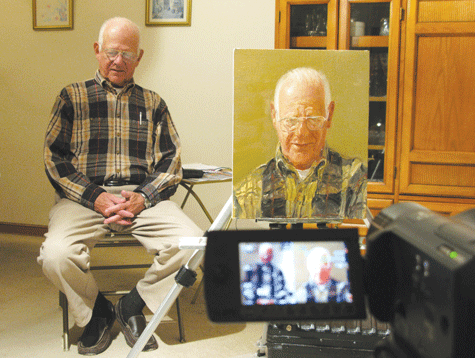By MORDECAI SPECKTOR
Not many members of Minnesota’s Jewish community saw Adolf Hitler speak.

However, Herbert Fantle at the age of eight, accompanied his mother, Irene, to a mass gathering in downtown Vienna, on March 15, 1938, where they heard Hitler’s welcoming speech to a million cheering Austrians.
“She wouldn’t let me go too close [to Hitler],” Fantle later recounted. “She said it was too dangerous.”
In her eulogy for Herb Fantle, who died Sept. 2 in St. Paul, Rabbi Esther Adler, of Mount Zion Temple in St. Paul, said, in regard to Hitler’s return to Austria, “They knew that night that they had to leave.”
To me, he was Uncle Herb, married to Aunt Betty (née Waller), my late mother’s younger sister. I knew him for nearly all of my life.
“Herb was very much a product of his times and experiences,” Rabbi Adler noted. “He was born in Vienna in 1929 to a comfortable middle-class family and surrounded by the rich culture of opera and classical music, which he continued to love for the rest of his life.”
As a young boy, I knew Herb’s parents, Irene and Frank Fantle, who lived in St. Paul; but only learned at the funeral service that Frank, who worked in a bank, had been arrested on Kristallnacht, Nov. 9, 1938, and taken to Dachau. Kristallnacht was especially vicious in Vienna; only one of the 94 Jewish houses of worship escaped destruction. Some 700 Jews were murdered or committed suicide that night.
When Frank Fantle returned to Vienna after 63 days in Dachau, the family became more determined to get out of Austria. Through a sponsor, they made their way to Scotland, and eventually settled in St. Paul.
Herb tells more about this time in his family’s history in a 2012 YouTube video made while he sat for a portrait painted by Félix de la Concha (bit.ly/fantle-portrait).
(During a visit to Jerusalem many years ago, I stopped in a shop called Gans, which sold Israeli-made artisanal craft items. As it happened, the owner was from Vienna, and had a 1939 Vienna telephone book. My uncle’s family was listed; the surname was spelled “Fantl” — the “e” on the end was added in America. Sigmund Freud also had a listing.)
As recounted by Rabbi Adler, Herb attended Marshall High School, then studied math at the University of Minnesota. “Herb was really good at mathematical analysis; he was like a human calculator,” she said, and added that when Herb and Betty went grocery shopping, Herb would add up the items, “calculate the total in his head, and get it right within pennies every single time.”
Herb and Betty, who met on a blind date, recently celebrated their 63rd wedding anniversary.
While working on a doctorate in math, Herb was called up for service in the U.S. Navy Reserve during the Korean War.
My cousin Phil Fantle, Herb and Betty’s elder son, mentioned in his eulogy that Herb never served on a ship, “but somehow grew a passion for the sea and, starting in 1970, he and mom sailed and visited every corner of the world. David and I were fortunate enough to come on that first 69-day voyage, despite missing almost three months of school.”
After many years of working in the corporate world, at the age of 40, Herb made a career change. He went to work as a stock and investments broker.
One of my formative influences came from stamp collecting, which Herb encouraged. He had a large and valuable collection of stamps and coins, and shared his hobby with his children, nieces, nephews and grandchildren. Herb gave me stamps and taught me about mounting stamps in albums. Stamp collecting became a portal to the wider world, geography and foreign cultures.
Herb also loved old movies, including those by the Marx Brothers and Laurel and Hardy. This passion for film was taken up by his son Dave, who recently co-authored, with Tom Johnson, Hollywood Heyday: 75 Candid Interviews with Golden Age Legends.
“Herb and Betty were longtime members of Mount Zion,” said Rabbi Adler, at the end of her eulogy. “While that was mostly Betty’s doing, she had Herb’s full support. He was not a religious man, but when Rabbi [Adam] Spilker suggested he become Bar Mitzva at age 83, it was very meaningful for the whole family.”
She added that Betty and Herb were members of the shul’s “famed Havurah Gimmel… forming deep and lasting friendships.”
And the rabbi mentioned that Herb “loved” the St. Paul JCC, and that Herb and Betty established the Fantle Family Fund, an endowment to support musical events.
I would be remiss by not mentioning that Herb also was a Republican, which led to raucous political arguments with our left-leaning family members at numerous gatherings. The disagreements never progressed beyond the shouting stage.
My wife, Maj-Britt, and I visited Herb at The Alton Memory Care in St. Paul, about a week before he died. Perhaps, Herb displayed a glimmer of recognition when he saw us. He didn’t speak and was in a frail state. I hope he enjoyed our visit.
“Alzheimers/dementia took everything away from my dad over the past few years,” Phil Fantle said in his heartfelt eulogy at Mount Zion. “If he understood his condition, he’d be happy to be at rest. I intellectualized all this and thought his passing would be easier. The finality has brought a lot of sadness, but I’m also happy at my remarkable good fortune — to be my dad’s son.”
And when my cousin Dave posted a funeral notice on his Facebook page, he included this comment: “Love you, Dad. Thanks for giving me a great life.”
In addition to his wife, Betty; sons, Phil, and his wife, Susan, and Dave, and wife, Cathy; Herb is survived by grandchildren, Grace (Jonah) Kaplan, Jacob, Maddie, Max, Jenna and Alec Fantle; and great-granddaughter, Rena.
May Herb’s memory always be for a blessing.
(American Jewish World, Sept. 12, 2018)




















